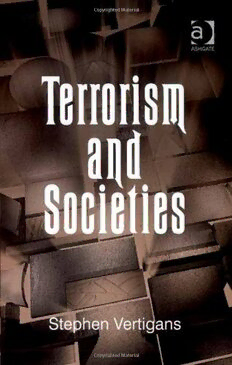
Terrorism and Societies PDF
207 Pages·2008·1.115 MB·English
Most books are stored in the elastic cloud where traffic is expensive. For this reason, we have a limit on daily download.
Preview Terrorism and Societies
Description:
This title examines a range of terror groups and explores the relationship between people and local and global social processes and activities that result in terrorism in different societies. Through adapting a multifaceted approach to terrorism, this volume is designed to provide a detailed analysis of terror groups which is not available in other research.A number of common questions are raised: Which ideologies do terror groups hold? What is it about societies and social contexts that contribute towards groups forming and people joining? How important is history in the formation of terror groups? And why do the majority of people who share experiences not become part of the same group?These questions are applied to case studies of contemporary relevance which are associated with religion, nationalism, pro state terrorism, militia and racialist groups. Each chapter is designed to enable the reader to gain a clear understanding about the reasons why terror groups form. As such it enhances our levels of knowledge about commonalities and differences in key aspects of terrorism, namely discourse, routes into terrorism, roles of socializing and the social contexts in which groups develop. This volume should be recommended reading for courses on terrorism, conflict, sociology of religion and globalization.
See more
The list of books you might like
Most books are stored in the elastic cloud where traffic is expensive. For this reason, we have a limit on daily download.
